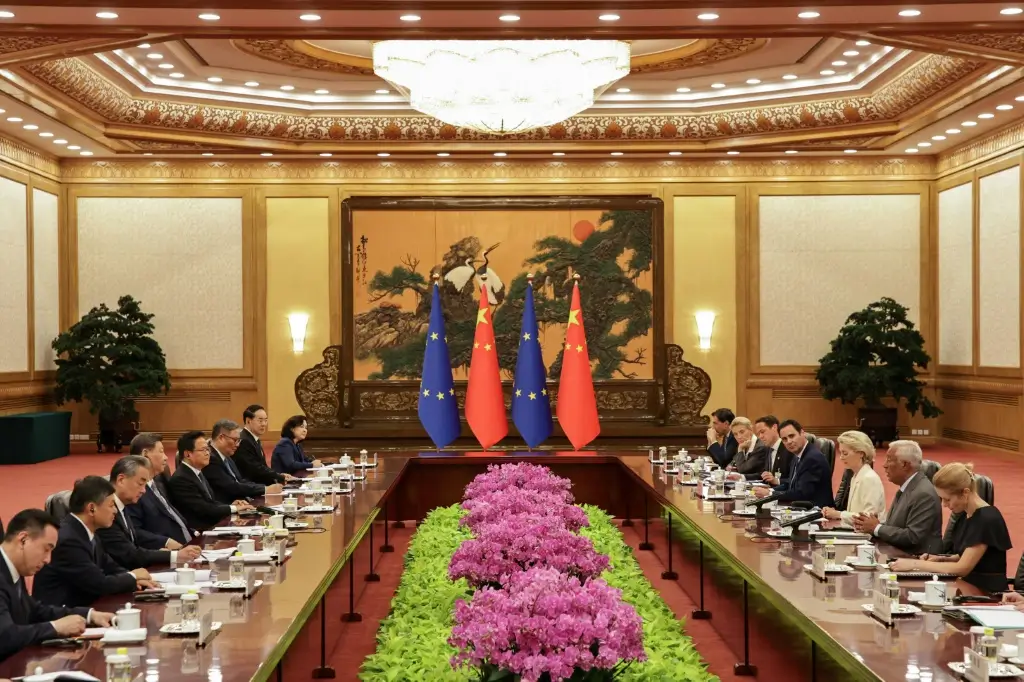
Amid deepening global tensions and shifting geopolitical alliances, leaders from the European Union and China convened in Beijing for a high-stakes summit addressing critical issues from the war in Ukraine to trade imbalances and market access. While Chinese President Xi Jinping emphasized the need for mutual trust and cooperation, EU leaders pressed for concrete action, particularly regarding China’s ties with Russia and ongoing economic disputes.
While the summit was intended to celebrate 50 years of diplomatic relations between the EU and the People's Republic of China, ongoing tensions dominated the agenda. Points of contention include:
Despite the friction, both sides appeared willing to engage diplomatically, with von der Leyen and Costa committing to maintaining dialogue at the highest level.
European Commission President Ursula von der Leyen echoed Costa's concern, emphasizing that EU-China cooperation has reached a critical point: “As our cooperation has deepened, so have the imbalances. We have reached a turning point. A re-evaluation of our bilateral relations is essential.”
She further stated that both sides must acknowledge their respective concerns and work toward "real solutions." Upon her arrival in Beijing, von der Leyen shared on X (formerly Twitter) that the summit “offers an opportunity to both advance and rebalance our relations,” expressing hope for mutually beneficial cooperation.
President Xi Jinping responded by calling for improved communication and strategic alignment between China and the EU: “The more difficult and complex the international situation becomes, the more important it is for China and the EU to strengthen communication, enhance mutual trust, and deepen cooperation,” Xi said, according to Chinese media.
Chinese state broadcaster CCTV reported that Xi emphasized the potential for both sides to find “common ground” despite differences.
One of the most urgent concerns for the EU is the massive trade deficit with China, which reached $360 billion last year. Von der Leyen labeled it “unsustainable” and called for:
China, however, dismissed these concerns and stated that the EU must "rebalance its mentality", not its economic relationship.
In retaliation for EU tariffs on Chinese electric vehicles, Beijing launched investigations into European pork, brandy, and dairy products.
A central issue remains China’s perceived support for Russia during the Ukraine conflict. While China maintains economic and political ties with Moscow, the EU views this as tacit endorsement of the invasion. EU Council President António Costa called on China to use its international influence to help end the war in Ukraine. Last week, the EU passed a new round of sanctions on Russia, including measures targeting two Chinese banks. In response, China’s commerce ministry issued a formal diplomatic protest to the EU.
A senior EU official commented: “This is a core issue for Europe. We know that Chinese companies supply around 80 percent of the dual-use goods to the war.” These goods, while technically civilian in nature, have potential military applications. The EU is urging China to implement tighter customs and financial controls. “We’re not naive. We’re not asking China to cut relations, but to step up the controls,” the official added.
Despite tensions, both sides recognize the importance of ongoing dialogue. EU leaders stressed that constructive conversations are necessary to navigate geopolitical challenges and safeguard mutual interests. One area where common ground may be found is climate change. Discussions are underway about issuing a joint declaration on climate cooperation, potentially providing a rare point of unity in an otherwise complex and divisive summit.